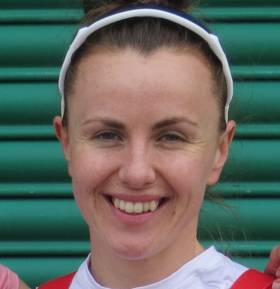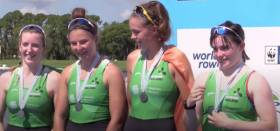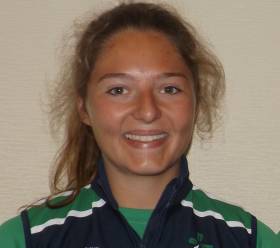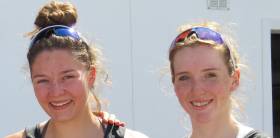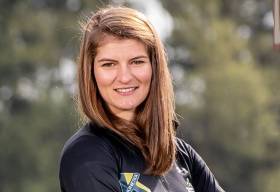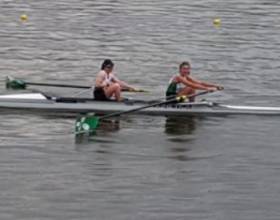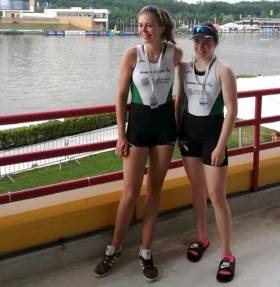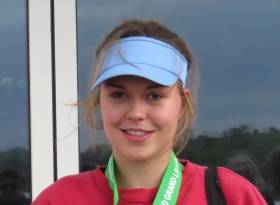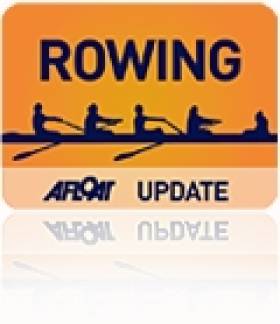Displaying items by tag: Eimear Lambe
Olympic Place Evades Ireland Women's Four at World Championships
#Rowing: Ireland's ambitions of booking a slot for a fifth boat at Tokyo 2020 came up short. The Ireland four of Tara Hanlon, Eimear Lambe, Aifric Keogh and Emily Hegarty had the difficult task of taking a top-two place in their B Final. They found their pace coming up to the line, but Britain, in lane five, and Canada in lane six took the crucial spots, with Ireland finishing fourth behind third-placed China.
The crosswind was a problem during the race and immediately afterwards the authorities redrew the lanes to acknowledge that lanes five and six were favoured.
World Rowing Championshiops, Linz-Ottensheim, Day Seven (Irish interest)
Women
Four - B Final (First Two book Olympic places for boat): 1 Britain 6:55.08, 2 Canada 6:56.99; 3 China 7:02.28, 4 Ireland Ireland (T Hanlon, E Lambe, A Keogh, E Hegarty) 7:02.71.
Pair - B Final (First Five book Olympic places for boat): 1 Romania 7:18.88, 2 Ireland (A Crowley, M Dukarska) 7:20.68.
Lightweight Double Sculls - C Final (Places 13 to 18) 1 China 7:00.82; 5 Ireland (A Casey, D Walsh) 7:10.52.
Third Place in Heat for New Ireland Four at World Championships
#Rowing: The Ireland women’s four gave a good account of themselves on their first competitive outing together, just missing out on direct qualification from their heat of the World Rowing Championships in Linz, Austria.
Tara Hanlon, Eimear Lambe, Aifric Keogh and Emily Hegarty came up against Australia, who were dominant, and the United States, who overcame a poor start to take the second available semi-final spot. The Ireland crew pushed them right to line, with just 1.89 seconds between them at the finish.
World Rowing Championships, Linz, Austria, Day One (Irish interest)
Men
Pair – Heat One (First Four to Quarter-Finals; rest to Repechage): 6 Ireland (M O’Donovan, S O’Driscoll) 6:50.51.
Lightweight Double Sculls – Heat Three (First Three to Quarter-Finals; rest to Repechage): 1 Ireland (F McCarthy, P O’Donovan) 6:28.02
Women
Four – Heat One (First Two to A/B Semi-Finals; rest to Repechage): 3 Ireland (T Hanlon, E Lambe, A Keogh, E Hegarty) 6:44.72.
Pair – Heat Four (First Four to Quarter-Finals; rest to Repechage): 2 Ireland (A Crowley, M Dukarska) 7:13.30
Lightweight Double Sculls – Heat Four (First Four to Quarter-Finals; rest to Repechage): 4 Ireland (A Casey, D Walsh) 7:25.62.
#Rowing: The Ireland women’s four which took silver at the World Under-23 Championships in Florida are the Afloat Rowers of the Month for July.
It was a month of outstanding achievements for Ireland rowers. The men’s double of Philip Doyle and Ronan Byrne and the lightweight double of Paul O’Donovan and Fintan McCarthy both took silver medals at the World Cup regatta in Rotterdam – Paul O’Donovan fishing a stroke coach from the water and immediately getting back to racing. Gary O’Donovan took bronze in the lightweight single sculls.
The Irish Championships was the biggest ever, featuring the emergence of new young crews such as junior single sculls champion Holly Davis, and capped off with wins in the women’s senior eight for NUIG/Castleconnell and the men’s senior eight for UCD. Davis (14) went on to win gold in the junior single sculls the Home International Regatta, and the men’s junior eight, pair and quadruple also won gold.
Three Irish crews – UCD, Commercial and Skibbereen’s Mark O’Donovan and Shane O’Dricoll – reached semi-finals at Henley Royal Regatta.
The World Under-23 Championships in Sarasota Bradenton saw the men’s coxed four take seventh, the lightweight women’s double fourth, and the lightweight men’s quadruple take a bronze medal.
The achievement of the women’s under-23 four of Claire Feerick (Neptune), Eimear Lambe (UCD), Tara Hanlon (UCC) and Emily Hegarty (UCC) was historic. They became the first Ireland women’s crew in a sweep event to take a medal at a World Championships.
They are the Afloat Rowers of the Month.
Rower of the Month awards: The judging panel is made up of Liam Gorman, rowing correspondent of The Irish Times and David O'Brien, Editor of Afloat magazine. Monthly awards for achievements during the year will appear on afloat.ie. Keep a monthly eye on progress and watch our 2019 champions list grow.
#Rowing: Ireland took a silver medal at the World Rowing Under-23 Championships today through the women’s four of Claire Feerick, Eimear Lambe, Tara Hanlon and Emily Hegarty, who swapped into the stroke seat for Lambe.
Britain and Ireland swept into the lead early and were clear of the rest in the final quarter. Britain found just enough to beat Ireland by 1.46 seconds.
World Rowing Under-23 Championships, Sarasota Bradenton, Florida (Irish interest)
Women
Four – A Final: 1 Britain 6:34.22, 2 Ireland (C Feerick, E Lambe, T Hanlon, E Hegarty) 6:35.68, 3 United States 6:39.89.
Third Spot in Fast Heat for Ireland Four in Florida
#Rowing: Ireland took third place in a fast heat of the women’s four at the World Rowing Under-23 Championships in Sarasota-Bradenton in Florida.
The winner alone went directly through to the A Final. The United States claimed this spot, with Britain and Ireland closing fast coming to the line. This was much the faster of the two heats.
The Ireland crew of Claire Feerick, Emily Hegarty, Tara Hanlon and Eimear Lambe would hope to qualify through their repechage on Thursday.
World Rowing Under-23 Championships, Sarasota-Bradenton, United States (Irish interest)
Men
Four, coxed – Heat Two (Winner to A Final; rest to Repechages): 1 Australia 6:11.99; 4 Ireland (B O’Rourke, R Corrigan, D Lynch, J Quinlan; cox: E Finnegan) 6:18.79.
Women
Four – Heat One (Winner to A Final; rest to Repechages): 1 United States 6:32.15; 2 Britain 6:32.96, 3 Ireland (C Feerick, E Hegarty, T Hanlon, E Lambe) 6:33.10.
#Rowing: The Ireland women’s four took fifth place, 11th overall, in their B Final at the World Cup in Poznan this morning.
Britain Two won an interesting race. Poland held the early lead, with Ireland, Germany and New Zealand not far behind. As Poland dropped back – and Croatia dropped out – the lead was taken over by New Zealand. However, Britain Two and Germany were the strongest crews in the second 1,000 metres, with Britain snatching the win from Germany by five hundredths of a second.
New Zealand were third and Ireland were over a length behind fourth-placed Poland.
Ireland finished sixth in the B Final of the women’s pair, 12th overall. In a close race, the United States Two won from Germany and Chile. Behind them, one second covered Italy Two, China Two and Ireland.
World Cup Regatta, Poznan – Day Three (Irish interest)
Women
Four – B Final (Places 7 to 12): 1 Britain Two 7:10.74, 2 Germany 7:10.79, 3 New Zealand 7:11.06; 5 Ireland (T Hanlon, M Dukarska, A Crowley, E Hegarty) 7:19.68.
Pair – B Final (Places 7 to 12): 1 United States Two 7:48.08, 2 Germany 7:50.03, 3 Chile 7:50.50; 6 Ireland (C Feerick, E Lambe) 7:56.69.
#Rowing: Ireland’s Eimear Lambe and Claire Feerick took sixth place in their semi-final of the women’s pair at the World Cup in Poznan, Poland, this morning. They will take a place in the B Final.
New Zealand’s Kerri Gowler and Grace Prendergast, who hold the world’s best time, took control early on and won well. China One took second and Italy One beat the United States Two to the crucial third place, and qualification for the A Final.
World Cup Regatta, Poznan, Poland – Day Two (Irish interest)
Women
Pair – Semi-Final One (First Three to A Final; rest to B Final): 1 New Zealand 7:32.18, 2 Italy One 7:35.99, 3 China One 7:36.43; 6 Ireland (C Feerick, E Lambe) 7:51.17.
#Rowing: Ireland’s women’s pair of Claire Feerick and Eimear Lambe qualified for the semi-final at the World Cup Regatta in Poznan, Poland. The young crew took a clear second place behind Megan Kalmoe and Tracey Eisser of the United States in their repechage. The USA One crew were clear winners, while Feerick and Lambe did well to win a battle with Canada One to claim the second – and final – qualifying spot.
World Cup Regatta, Poznan, Poland, Day One (Irish interest)
Women
Four
Heat One (First Three to A/B Semi-Finals; rest to Repechage): 1 Australia 6:32.50, 2 United States Two 6:33.57, 3 Britain 6:35.69; 4 Ireland (T Hanlon, M Dukarska, A Crowley, E Hegarty) 6:38.44.
Pair
Heat Two (Winner to A/B Semi-Final; rest to Repechages): 1 Italy Two 7:07.10; 2 China Two 7:09.55, 3 Ireland (E Lambe, C Feerick) 7:10.31. Repechage One (First Two to A/B Semi-Final; next two to C Final; rest to D Final): 1 United States One 7:15.35, 2 Ireland 7:19.33; 3 Canada One 7:26.52.
#Rowing: Ireland’s Claire Feerick and Eimear Lambe finished third in their heat of the women’s pair at the World Cup Regatta in Poznan in Poland this morning.
To qualify directly for the semi-finals, the Ireland crew would have had to win this heat and Feerick and Lambe were at or near the head of the field throughout the race. They were marginal leaders through the 1,000 metres and the 1500 metres, after which China Two took over. Italy Two passed them coming up to the line to take top spot.
Feerick and Lambe will compete in a repechage with the aim of taking this route to the A/B semi-finals.
World Cup Regatta, Poznan, Poland, Day One (Irish interest)
Women
Pair
Heat Two (Winner to A/B Semi-Final; rest to Repechages): 1 Italy Two 7:07.10; 2 China Two 7:09.55, 3 Ireland (E Lambe, C Feerick) 7:10.31.
#ROWING: Eimear Lambe and Jasmine English qualified directly for the semi-finals of the women’s double sculls at the European Junior Rowing Championships in Hazewinkel in Belgium today. The Ireland crew finished second to Romania and will compete next tomorrow morning.
Ireland’s three other crews must compete in repechages. The men’s double of Conor Carmody and David O’Malley finished fourth in their heat; while the junior men’s pair of David and Brian Keohane fifth and single sculler Erin Barry both finished fifth.
European Junior Rowing Championships, Hazewinkel, Belgium (Irish interest):
Men
Pair – Heat Two (First Two Directly to A/B Semi-Finals: 5 Ireland (D Keohane, B Keohane) 7:30.39.
Double Sculls – Heat Three (First directly to A/B semi-finals): 4 Ireland (C Carmody, D O’Malley) 6:56.91.
Women
Double Sculls – Heat One (First Two Directly to A/B Semi-Finals): 2 Ireland (J English, E Lambe) 7:54.10.
Single Sculls – Heat Three (First Two directly to A/B Semi-finals): 5 Ireland (E Barry) 8:38.33.


























